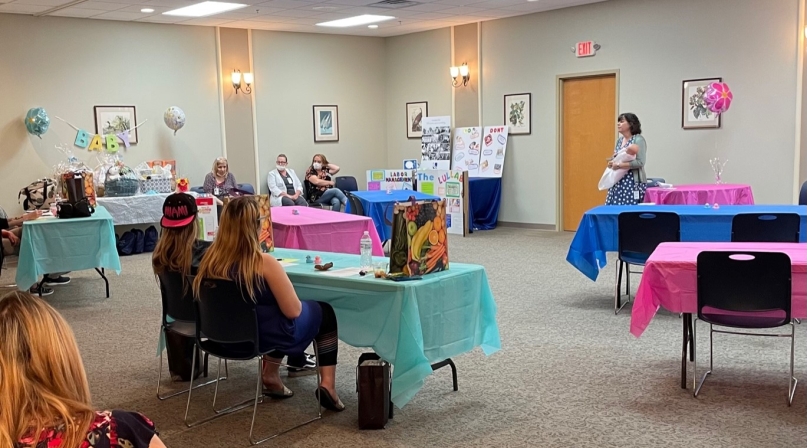Home visits buoy expecting, new parents in Madison County, N.Y.

Key Takeaways
Even children who grow up to be rigid rule followers have their rebellious phases, and often, that’s when they’re in the womb. But that’s OK.
Madison County, N.Y.’s health department offers plenty of reassurance, particularly when public health nurse Molly Limbert shows up as the bearer of good news. Her regular home visits before and after birth help expectant and new mothers feel at ease and armed with information in hopes of starting their newest residents off on a healthy course.
“The manual doesn’t always fit, so that’s what I’m here to help with,” she said. “I’m there as little as possible, but as much as I’m needed.”
Limbert’s patients come referred by doctors, hospitals, community health agencies or expectant parents themselves. She shows up once a month during a pregnancy, then once a week after birth, up to two months for most newborns. Some circumstances warrant an extension of up to a year. Almost 11 percent of Madison County residents live below the federal poverty line.
“It’s for families who need a little extra support,” Limbert said. “We tailor what we offer to a family’s needs.”
That may be as a lactation consultant, teaching parents how to approach potential illnesses, sleep training or what to anticipate in a baby’s development. Generally, Limbert hopes to be there to answer the questions that books don’t always cover and to serve as a live resource for families. Visits can take place in the home or any location where the family feels comfortable.
After the birth, her visits take on an added emphasis on maternal health, with screenings for postpartum depression, and Limbert is able to assess the situation to possibly refer families for additional services. She’s also a resource for new mothers who might not have someone to help them navigate the new world they’ve entered.
Right now, the most pressing need is baby formula, and Limbert has been compiling a list of stores mothers can call during the shortage. Some mothers, like one Limbert had visited recently, needed specific formula.
“We’re hoping we’re over the peak of this,” she said. “Any time you can’t feed your child, no matter how old they are, it’s a major concern.”
While not the culmination of the county’s programming, the Community Health Services program holds a community baby shower for mothers who haven’t given birth yet and continues on the theme of going beyond the new baby books to offer dynamic support for new parents. It’s a collaboration among the county’s Healthy Families program, the local hospital and doctors’ offices, all of which sponsor gift bags for mothers and babies and gift baskets that are raffled off.
The shower combines education with a healthy dose of humor, hands-on work using car seats and a luncheon.
“We want to make it light-hearted, because you learn best when you have fun,” Limbert said, noting that keeping new mothers relaxed helps lift their spirits. “This isn’t supposed to be a dry subject, it’s a new baby.”
“These [baby showers] are exhausting because I give it my all.”
Director of Community Health Services Rebecca LaPorte said that shows, because all of the feedback for the community baby showers rate them as “excellent” and “extremely helpful.”
Federal assistance on infant formula
In addition to the Operation Fly Formula, delivery of 13 million 8-ounce bottles of formula, the Department of Health and Human Services has offered new informational resources to help cope with the shortage.
A landing page at www.hhs.gov/formula/index.html provides information and answers in multiple languages to common questions for families on where to find formula and tips for finding safe substitutes.
A baby formular shortage social media toolkit at www.hhs.gov/formula/social-media-toolkit/index.html provides resources available for families who need formula with sample social media posts.
Attachments
Related News

USDA and HHS release new dietary guidelines
On January 7, U.S. Department of Agriculture Secretary Brooke Rollins and U.S. Department of Health and Human Services Secretary Robert F. Kennedy, Jr. unveiled the new Dietary Guidelines for Americans, 2025–2030.

County Countdown – Dec. 15, 2025
Every other week, NACo's County Countdown reviews top federal policy advocacy items with an eye towards counties and the intergovernmental partnership.
